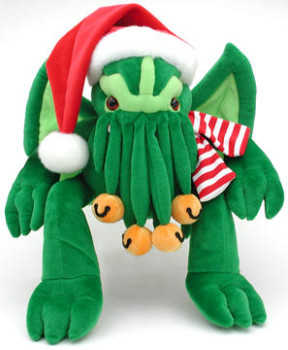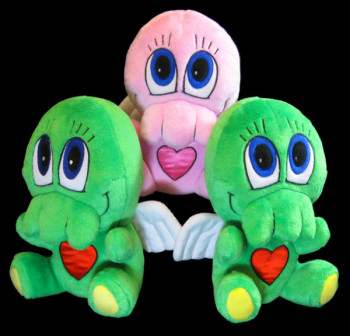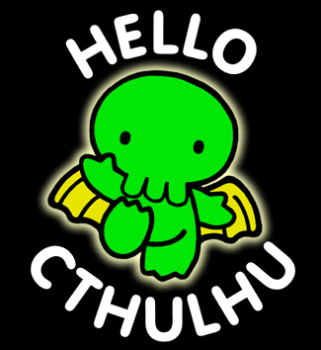The Doom That Came to Lovecraft
 I turned 45 right before Halloween and once again I feel the cold claws of senescence tighten their grip around my throat. I used to pride myself on my memory, which, while not truly “photographic” – assuming such a thing even exists – was always extremely keen. Note that that I said “was.” Lately, I’m finding it harder and harder to keep the details of my wasted youth straight in my mind.
I turned 45 right before Halloween and once again I feel the cold claws of senescence tighten their grip around my throat. I used to pride myself on my memory, which, while not truly “photographic” – assuming such a thing even exists – was always extremely keen. Note that that I said “was.” Lately, I’m finding it harder and harder to keep the details of my wasted youth straight in my mind.
A good case in point concerns when I first encountered the writings of H.P. Lovecraft. I know for certain that it was after I first started playing Dungeons & Dragons, but before Chaosium released its Lovecraft-inspired RPG, Call of Cthulhu. That suggests, then, the likeliest date is sometime in 1980, since, by then, I’d not only have acquired a copy of Gary Gygax’s masterwork, the Dungeon Masters Guide, whose Appendix N cited HPL as one of “the most immediate influences upon AD&D,” but had also made the acquaintance of older players who frequently extolled the virtues of pulp literature to my friends and I.
What I do remember is that, at the time, the very name “Lovecraft” sounded fantastical to me. I almost couldn’t accept that it was a real name, since I’d never heard of anyone with such a moniker before. This probably contributed greatly to the reverence in which I’d later hold his writings, a reverence that has only increased as I’ve grown older and had occasion to read and re-read his stories countless times.
What I also remember was that, not long after learning about the Gentleman from Providence, I rushed to my local library to find copies of his “books,” not yet realizing that most of his output consisted of short stories. What I found were battered copies of some of the Ballantine Adult Fantasy collections, along with the Scholastic Book Services edition of The Shadow over Innsmouth and Other Stories of Horror. The latter had a lasting effect on my imagination, thanks to its creepily comical depiction of a spectral inhabitant of the titular New England town. From then on, Lovecraft’s creations struck a powerful chord with me and, as I later learned, with so many of my fellow gamers. They were the epitome of horror.
How times have changed.
 That I am a joyless stick in the mud is a well-established fact, as anyone who knows me can attest. This is particularly true these days when it comes to the way that Lovecraft’s brain children, most especially, Great Cthulhu, have been turned into toothless geek totems. It’s next to impossible nowadays to visit any shop or online site that caters to gamers and related nerds without encountering blasphemous malignancies like those that accompany this post. These are eldritch abominations the likes of which Ech-Pi-El, even in his worst nightmares, could never have imagined!
That I am a joyless stick in the mud is a well-established fact, as anyone who knows me can attest. This is particularly true these days when it comes to the way that Lovecraft’s brain children, most especially, Great Cthulhu, have been turned into toothless geek totems. It’s next to impossible nowadays to visit any shop or online site that caters to gamers and related nerds without encountering blasphemous malignancies like those that accompany this post. These are eldritch abominations the likes of which Ech-Pi-El, even in his worst nightmares, could never have imagined!
Of course, I’m only semi-serious in recoiling at nonsense like this. On the one hand, as too many of my friends and colleagues rightly say, it’s just a little bit of fun. Where’s the harm in that? Isn’t it wonderful, after all, that Lovecraft has made it. He – or at least Cthulhu – is now mainstream enough that you can find T-shirts and action figures and even short films starring professional wrestlers that feature the master of R’lyeh. What’s not to love?
Unlike me, Lovecraft had a highly developed sense of humor. He frequently engaged in clever jests with his many friends and correspondents, a good example of which is “The Battle That Ended the Century,” in which he pokes fun at members of his circle, including himself. He also genuinely enjoyed it when others pilfered ideas from him and ran with them in new directions, feeling that their doing so lent verisimilitude and heft to the “anti-mythology” he was weaving through his tales of Yog-Sothothery. What would he have thought of Hello Cthulhu? Would it have frustrated him as much as it does me or would he have seen it simply as evidence of the affection others still have for his creation?
Obviously, there’s no way to answer a question like this with any certainty. Even if there were, a creator’s work often takes on a life of its own and, on some level, it doesn’t really matter what the originator thinks. All I can say is that I am not fond of this development, as I feel that it lessens the impact of Lovecraft’s original conceptions, rendering them less horrific and frightening. Now, some might counter – and indeed have countered – that the cute-ification of Cthulhu is the result rather than the cause of Cthulhu’s no longer being scary. In my experience, this claim is often accompanied by the suggestion that the horror inherent in Lovecraft’s conception of an uncaring, alien universe is long gone, because most people nowadays accept that conception simply as fact and can thus no longer be horrified by it as Lovecraft’s readers in the first half of the last century would likely have been.
what the originator thinks. All I can say is that I am not fond of this development, as I feel that it lessens the impact of Lovecraft’s original conceptions, rendering them less horrific and frightening. Now, some might counter – and indeed have countered – that the cute-ification of Cthulhu is the result rather than the cause of Cthulhu’s no longer being scary. In my experience, this claim is often accompanied by the suggestion that the horror inherent in Lovecraft’s conception of an uncaring, alien universe is long gone, because most people nowadays accept that conception simply as fact and can thus no longer be horrified by it as Lovecraft’s readers in the first half of the last century would likely have been.
Perhaps. More likely, I think, is that most of us are simply unable (or unwilling) to come to grips with the nihilism that Cthulhu, Nylarthotep, and all the rest represent in Lovecraft’s writings. It’s so much easier to say “That’s not scary anymore” and go about decorating our desks with octopoid tchotchkes without giving any real consideration to what HPL was trying to convey through his creations.
In that respect, Cthulhu and his fellow Great Old Ones are a lot like vampires, another monster that was once a harbinger of soul-destroying terror and that has been reduced through its popularization to a joke. Dracula is filled with religious imagery and allusions; it is a book that derives much of its power from the reader’s ability to simultaneously fear the loss of one’s immortal soul and to recognize the temptation of physical persistence beyond one’s allotted years. Nowadays, Dracula (and vampires generally) is seen purely as sexy avatars of eternal youth without any of the theological “baggage” that made them so compelling – and dangerous – in the first place.
So it is with Cthulhu too, I fear.
This lack of “theological baggage” I believe has become quite common in modern horror, at least during the last 35 years or so. How many horror movies and novels out there are filled with all kinds of atrocities, but not once does a single character even break down in prayer or ask for some spiritual entity to save him or her?
Now before someone jumps on the religion-is-bad bandwagon, I’m not advocating for religion or even spirituality here. Not at all. But I do think it’s unrealistic when humans face true horror for at least SOME of them to seek protection or solace from a supposed higher power. And when the horror genre does focus upon religious or mythological elements, it often enough turns demons and angels and monsters and the like into little more than thugs with super powers or the latest version of James Dean, or both. Obviously all of this is not the case with all modern horror, but I think it’s more common than the reverse. Sign of the times, I suppose.
I think that “the cue-ification” of Cthulhu is a form of whistling past the graveyard. these stories remain some of the most effective psychological horror ever written. The only thing that has produced more existential angst in me has been Dostoyevsky’s “Notes from the Underground.” Making the Old Ones adorable is a way of diffusing said angst. I think the same thing happened to vampires and werewolves, and the entire catalog of Fairy Tales. I don’t think this is true for everyone who has jumped on chibi horror band wagon. I know many people who only know Cthulhu through games like Munchkin Cthulhu, or Cthulhu Saves the World. I think this is similar to what happened to Fairy Tales. How many people know how Cinderella really ended.
All the monsters of yesteryear become tomorrows pop-cultural icons.
Personally I think HPL would have been amused by this turn since the Mythos were created to stem this very tide. Were he alive today, well he would be very old, but he might even incorporate this new turn into a story OR he would abandon it all together and write something else.
In truth some of my favorite Lovecraft stories are not even Mythos related ones.
I personally do feel we have hit over-saturation point on the Mythos monsters. I think gamers of our age looked to Lovecraft and the Mythos as some sort of Ur-myth and we were the special few that had this knowledge. Get them in the D&DG only to loose them again added to their mystique. So every game that comes out has to pay lip service or at least pay a tithe to Mythos by including them.
Maybe that is the true horror. When Great Cthulhu comes he will not be seen with fear, but greeted by legions of adoring “fans”. Maybe HLP has the last laugh afterall.
Every time you comment on your middle school years Mr. Maliszewski, it’s almost as if I’m reading about my own. For example, I just turned 45 and my first exposure to Lovecraft was through AD&D as well, probably around 1980.
I’m sympathetic to your criticisms: I’m not crazy about Cutie Cthulhu, or similar things. But, welcome to the age of do what you want with culture.
I’ve thought a lot about what makes (or made) Cthulhu scary, or other Lovecraftian nasties. I’ve often wondered how much of Lovecraft’s nihilism actually relies upon “theological baggage” as you’ve put it. For example, does a “blasphemous” tome or monster make sense in a truly nihilistic universe?
A similar point comes up with current vampire mythology. The crucifix repeller is no longer part of it because, my guess, of multi-cultural concerns. Why would a vampire hate the sight of a crucifix but not a star of David or crescent moon?
Interesting thoughts. Always enjoy your posts sir.
Cute Cthulhus are a joke. And not meant to be anything like that. What creature from myth or fiction could possible the most inappropriate to combine with cute pink dolls for little girls? And it seems popular culture has decided that this would not be godzilla or Frankensteins monster, but Cthulhu. It’s acultural joke that requires the most absurd combination imaginable, and Cthulhu is the one to fit that bill.
Though I always find it puzzling how Cthulu ended up becomming the poster boy for Lovecrafts work. Of all the cosmic horrors, he’s probably the one who appears in the least amount of story and has the least lore associated with him. From what I am aware, he really only appears in The Call of Cthulhu where he does nothing but waking up and immediately disappearing again.
Contrast that with Yog-Sothos, Shub-Niggurath, Nyarlathotep and even Dagon, and all of them play a much bigger and active role and have much more appearances. The big problem with them is that they are really difficult to draw. Cthulhu is easy, because he has a definite physical form that is made from parts of existing creatures. Or at least he does now, with everyone having agreed on how he looks like. Cthulhu looks good on a book cover, like no other of the Old Ones. Which is ehy everyone calls the Yog-Sothos Mythos the “Cthulhu Mythos”. It’s like calling Star Wars the “Lando Calrissian Saga”. That the character only appears in two out of six movies doesn’t even make it any less appropritate as a comparison.
“…the horror inherent in Lovecraft’s conception of an uncaring, alien universe is long gone, because most people nowadays accept that conception simply as fact and can thus no longer be horrified by it as Lovecraft’s readers in the first half of the last century would likely have been.
Perhaps. More likely, I think, is that most of us are simply unable (or unwilling) to come to grips with the nihilism that Cthulhu, Nylarthotep, and all the rest represent in Lovecraft’s writings. It’s so much easier to say “That’s not scary anymore” and go about decorating our desks with octopoid tchotchkes without giving any real consideration to what HPL was trying to convey through his creations.”
Was he trying to convey anything more nihilistic than the idea of a mechanical, purposeless universe, which, as you say, is something accepted by many and, in fact, preferred by many? After all, if the universe has no purpose, just grinds on, then “eat, drink, and be merry” (watchwords for a culture of consumption) have philosophical sanction; you can’t do anything about the bigger situation, and no one has a life to come to anticipate, so stimulate your nerve endings pleasurably (if that’s what you like), demonstrate in the street for social justice if that’s what you like — just don’t interfere with someone else’s pleasures. If Lovecraft was troubled by what he perceived to be the implications of his philosophy, why, he just needed counseling.
There has been some attempt at philosophical evaluation of HPL:
http://www.sffchronicles.com/threads/528635/